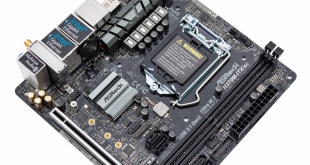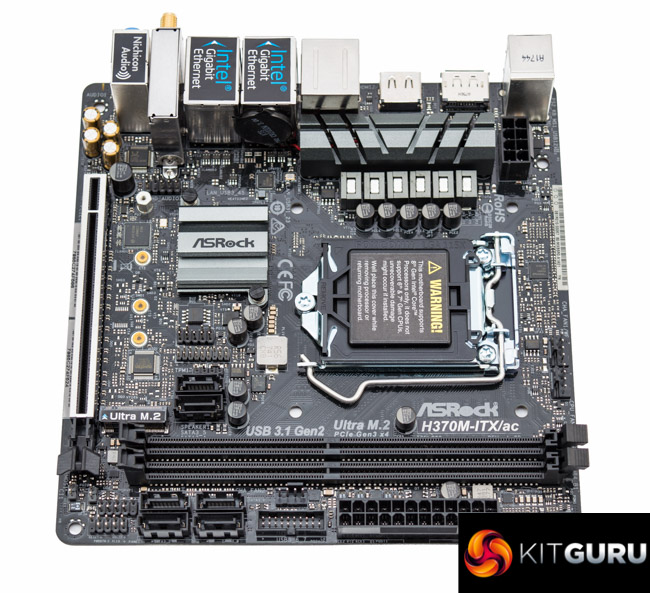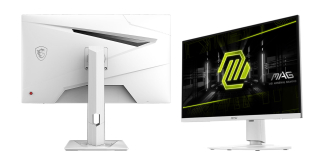
Mini-ITX motherboards can be particularly expensive due to the niche market segment, space-constrained form factor and increased R&D costs. Thankfully, motherboard chipsets like H370 lower the platform costs for mini-ITX solutions. ASRock's H370M-ITX/ac is a perfect example of this, bringing mini-ITX into a mainstream budget – but with what compromises?

Prospective buyers of Intel 8th Generation (Coffee Lake) CPUs looking to build to mini-ITX form factor systems have four supporting chipsets to choose from – Z370, H370, B360 and H310. These chipsets rank in the same order for performance and cost with Z370 being the most full-featured and expensive, H310 the least.
ASRock has been the most active motherboard vendor for mini-ITX options with product offerings for all four chipsets – the H310M-ITX/ac, B360M-ITX/ac, H370M-ITXac, Z370M-ITX/ac and Fatal1ty Z370 Gaming-ITX/ac. The subject of this review, the H370M-ITX/ac, is ASRock's middle option for Intel 8th Generation and mini-ITX.
With a price point of around £100 (US$110) for the H370M-ITX/ac, there are considerable savings to be made against Z370 mini-ITX motherboards from other vendors, such as the ASUS ROG Strix Z370-I Gaming (£180/$180) or Gigabyte Z370N-WiFi (£140/$150). Mini-ITX rivals in the H310, B360 and H370 segments are almost entirely absent making ASRock its own main rival, with only ASUS ROG Strix's H370-I Gaming (£125/$135) and B360-I Gaming (£120/$125) worth a mention.
There is an element of simplicity about the design of the H370M-ITX/ac with no fancy RGB lighting, just one M.2 slot and an audio implementation that's a couple of generations old. Yet the fundamentals are still in place with a decent quality VRM, dual Intel Gigabit LAN, support for USB 3.1 (10Gbps), onboard WiFi and competent all-round connectivity.
Keeping in mind the limitations of the H370 chipset compared to Z370 (notably a lack of CPU or memory overclocking) how well does ASRock's H370M-ITX/ac stand up to scrutiny?
| ASRock H370M-ITX/ac | |
| Form Factor | mini-ITX, 17cm x 17cm |
| CPU Socket | Intel LGA 1151 Version 2 |
| Chipset | Intel H370 |
| Memory | DDR4, 2 DIMMs, up to 32GB, up to 2,666MHz |
| On-board Graphics | Intel HD Graphics (supported CPUs) |
| Discrete Graphics | Single Graphics Card configurations only |
| Expansion Slots | 1 x PCIe 3.0 x16 (x16 electrical, from CPU) |
| Storage | 6 x SATA III 6Gbps (via Intel H370) 1 x M.2 (supports PCIe 32Gbps or SATA 6Gbps*) *Either M2 in SATA mode or SATA3_1 port |
| USB | 4 x USB 3.1 (4 Rear, all Type-A, via Intel H370) 4 x USB 3.0 (2 Rear, 2 Front, via Intel H370) 4 x USB 2.0 (2 Rear, 2 Front, via Intel H370) |
| Networking | 1 x Intel I219V Gigabit Ethernet 1 x Intel I211AT Gigabit Ethernet Intel Wireless-AC 3168 802.11ac 1T1R WiFi |
| Audio | Realtek ALC892 5.1 channel audio* *7.1 channel output available by using front panel audio with rear audio and configuring via Realtek driver |
| Fan Headers | 3, all support 3/4pin fans (1xCHA1/W_PUMP @ 2 Amps, 1xCPU @ 1A, 1xCHA2 @ 1A) |
| Rear I/O | 2 x Antenna Ports 1 x PS/2 Mouse/Keyboard Port 2 x HDMI 1 x DisplayPort 1.2 2 x USB 2.0 Ports 4 x USB 3.1 Gen2 Type-A Ports (10 Gb/s) 2 x USB 3.0 (5 Gb/s) 2 x RJ-45 LAN Ports 3 x HD Audio Jacks: Line in / Front Speaker / Microphone |
| UEFI | 1 x 128Mb AMI UEFI BIOS |
 KitGuru KitGuru.net – Tech News | Hardware News | Hardware Reviews | IOS | Mobile | Gaming | Graphics Cards
KitGuru KitGuru.net – Tech News | Hardware News | Hardware Reviews | IOS | Mobile | Gaming | Graphics Cards


